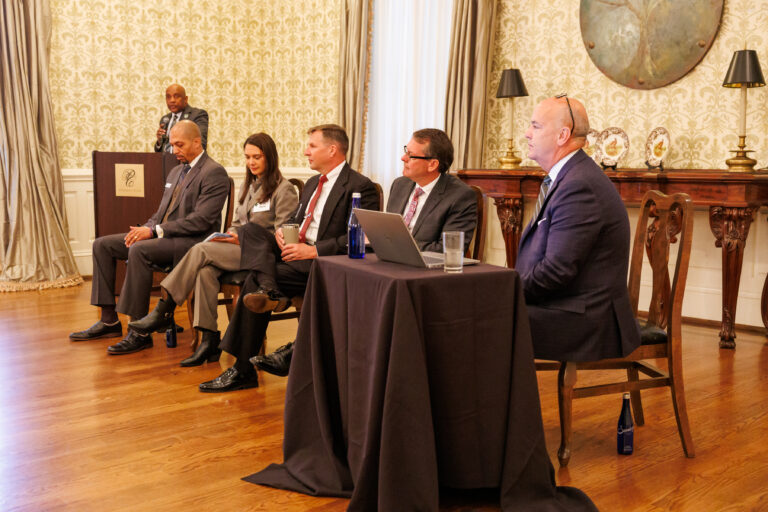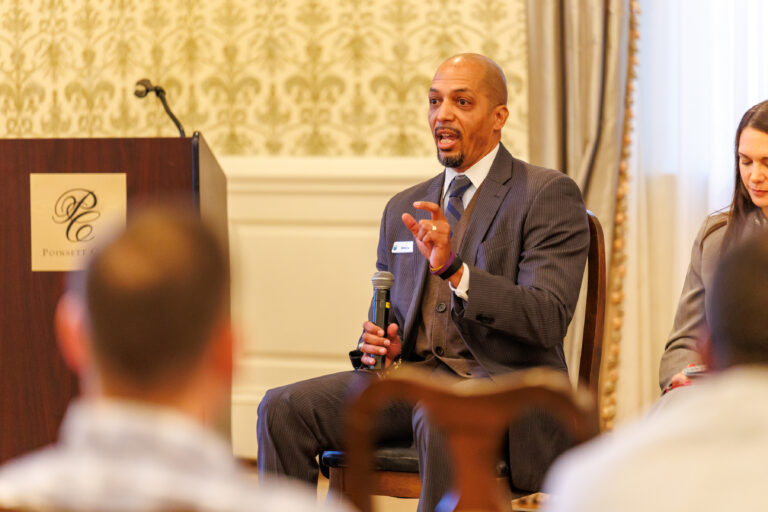
The University of South Carolina Upstate hosted a distinguished panel of experts today to celebrate the launch of its National Security and Government Institute (NSGI), during an event at the Poinsett Club in Greenville.
Attendees learned how USC Upstate and other institutions can play a pivotal role in providing cutting-edge research and development for military and cybersecure critical infrastructure controls to serve the U.S. Government’s strategic needs.
Under the leadership of retired U.S. Air Force Maj Gen T. Glenn Davis, the NSGI aspires to be the leading provider of full-spectrum government education and public discussion in the Southeast, as well as a hub for research, innovation, and collaboration in the field of national security and government affairs.
Maj Gen Davis, executive director of NSGI, took on the role of the panel’s moderator. He was joined by Lt Gen (ret.) Scott “K9” Kindsvater, Maj Gen (ret.) Patrick “2G” Higby, Colonel (ret.) Martha Monroe, and Colonel (ret.) Tony “Perk” Perkins.
Kindsvater, who served 10 combat deployments as a fighter pilot, kicked off the discussion by providing some sobering context about the current global situation. He detailed threats to the nation’s interests, particularly on the cyber front from China, Russia, Iran, and North Korea.
“When I retired 18 months ago, I felt bad because I’m actually handing over to my kids a world that is less safe than the world I inherited,” Kindsvater said. “That’s just where we’re at.”
Panelists discussed the U.S. Government’s posture toward cybersecurity threats and described the dire need for robust pipeline of highly skilled graduates. They talked about some of the “soft” or “transferrable” skills that these graduates will need to succeed.
“Information dominance, information warfare is a dynamic trait,” Perkins said. “Some of the things that differentiate people in the space—whether it be the battle space, the market space, or even the health space—is leadership. You want a good teammate, but you also want a good leader; one who has been a good follower, one who understands what’s going on, and how they can lead in a dynamic environment.”
For students, panelists also stressed the importance of collaboration, continuous learning, adversarial thinking, good cyber hygiene, and effective communication.
“For us cyber dudes, we are notorious for brilliantly understanding how a code executes or how a platform works, but then, when something bad happens and you try to explain it to someone who has that background, you completely lose them,” Higby said. “Rule No. 1, you’ve got to put it in Layman’s terms; you’ve got to be able to explain it to your grandmother.”
Panelists talked about cultural trends that are impacting cybersecurity, such as the proliferation of false information, particularly on social media.
“Social media is being heavily manipulated,” Higby said. “It’s now being done on an industrial scale. You can generate all sorts of likes and hits and algorithms. You no longer need 10,000 people to get 10,000 likes. You need one person who knows what to put into Chat GPT to write some code to manipulate whatever platform you’re on… You can manipulate large portions of the population.”
Davis said he was pleased with the panel’s insights and said it was a demonstration of the “firepower” that USC Upstate will bring to the NSGI.
“I am humbled, and I feel privileged that these folks have come here to spend a little time with us today,” Davis said.
USC Upstate students who were in the audience said they learned much from the panelists.
“I really think it would be helpful for us to start educating the public about the importance of not answering SPAM calls, or phishing emails,” said Victoria Sands, a senior IDS major. “The U.S. military does teach that. That’s less than 1% of people who know and understand this stuff.”
“The main thing I digested from this was the different criteria for students,” said Malik Tate, a senior cybersecurity major. “For one, leadership and taking that to another level… Another thing was the importance of paying attention to what you’re doing. Pay attention to what you’re uploading, what you’re looking for. Social media drives a lot and that’s what (attackers) are using to target people in our society.”
Stay tuned for more insights and recommendations that emerged from this dynamic panel discussion, and for future opportunities to engage with NSGI.

